Self-medication practices and associated factors in the prevention and/or treatment of COVID-19 virus : a population-based survey in Nigeria
Abstract
Background: The anxiety caused by the emergence of the novel coronavirus disease (COVID-19) globally has made many Nigerians resort to self-medication for purported protection against the disease, amid fear of contracting it from health workers and hospital environments. Therefore, the aim of this study was to estimate the knowledge level, causes, prevalence, and determinants of self-medication practices for the prevention and/or treatment of COVID-19 in Nigeria. Methods: A web-based cross-sectional survey was conducted between June and July 2020 among the Nigerian population, using a self-reported questionnaire. Statistical analysis of descriptive, bivariate, and multivariate analyses was done using STATA 15. Results: A total of 461 respondents participated in the survey. Almost all the respondents had sufficient knowledge about self-medication (96.7%). The overall prevalence of self-medication for the prevention and treatment of COVID-19 was 41%. The contributing factors were fear of stigmatization or discrimination (79.5%), fear of being quarantine (77.3%), and fear of infection or contact with a suspected person (76.3%). The proximal reasons for self-medication were emergency illness (49.1%), delays in receiving hospital services (28.1%), distance to the health facility (23%), and proximity of the pharmacy (21%). The most commonly used drugs for self-medication were vitamin C and multivitamin (51.8%) and antimalarials (24.9%). These drugs were bought mainly from pharmacies (73.9%). From the multivariate logistic regression model, male gender (OR: 0.79; 95% CI: 0.07–0.54), and sufficient knowledge on SM (OR: 0.64; 95% CI: 0.19–0.77) were significantly associated with self-medication. Conclusion: Despite the high knowledge and the risks associated with self-medication among the respondents, the practice is prevalent for perceived COVID-19 prevention and treatment. Based on the findings of this study the media and the community-based should be engaged to create awareness on the dangers of self-medication and the need for positive health behaviour concerning COVID-19. Pharmacies, patent medicine vendors, and traditional medicine practitioners have a role to play since most of the drugs are bought from them. A review and activation of relevant laws on drug use are also suggested.
Citation
Wegbon , A I , Edet , C K , Raimi , O , Fagbamigbe , A & Kiri , V A 2021 , ' Self-medication practices and associated factors in the prevention and/or treatment of COVID-19 virus : a population-based survey in Nigeria ' , Frontiers in Public Health , vol. 9 , 606801 . https://doi.org/10.3389/fpubh.2021.606801
Publication
Frontiers in Public Health
Status
Peer reviewed
ISSN
2296-2565Type
Journal article
Collections
Items in the St Andrews Research Repository are protected by copyright, with all rights reserved, unless otherwise indicated.

